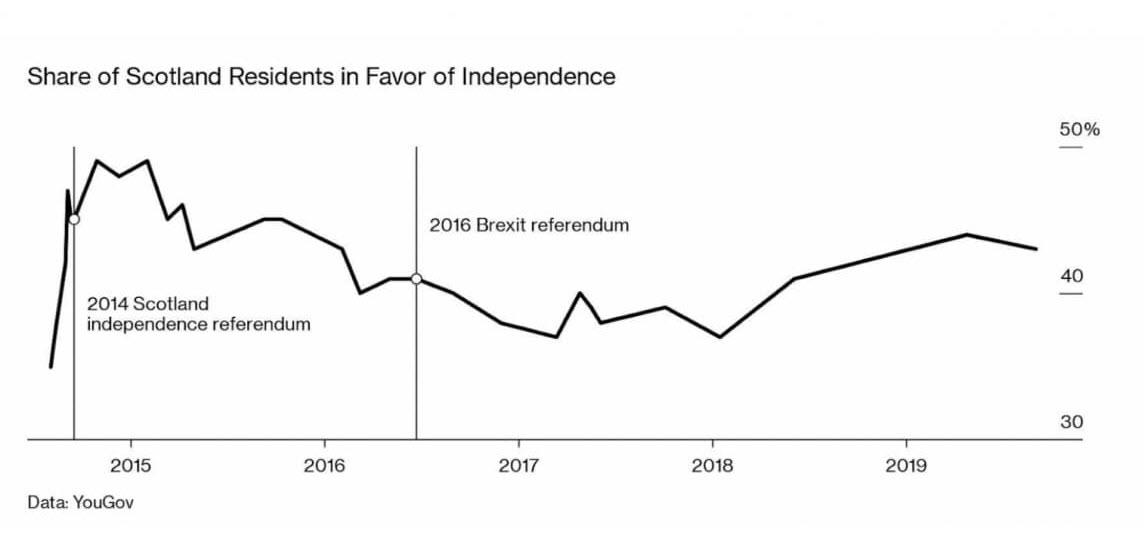North
Sea Oil Is Doomed
With Or Without Brexit
Zero Hedge,
23 November, 2019
The uncertainty of the future of Brexit has left the United Kingdom’s economy in stagnation as business investment falters on the eve of the nation’s December general election. While Boris Johnson tries to rally voters to instill their confidence in him to usher in a new era of economic prosperity and growth in Britain by way of leaving the European Union at any cost, the economy is, in fact, doing just the opposite. This is just one of the great ironies of Brexit, the separatist movement that just can’t seem to cut the cord.
“British business investment has fallen 1.1 percent since the June 2016 Brexit referendum, and analysts warn that it could cause long-term damage to the economy,” according to reporting from Al Jazeera this week.For the sake of comparison, “over the same period, business investment in the other Group of Seven (G7) big industrialised economies has risen 10 percent, with the United States posting an increase of 13 percent.”
That being said, low confidence in investment sectors and a general air of risk aversion is certainly not limited to Great Britain. The Al Jazeera report continues, “the International Monetary Fund says China-US trade tensions are hurting investment globally. But Brexit uncertainty threatens to turn the UK problem into a crisis.” The crisis is already beginning, as weak investment patterns have already make the UK’s economy too at risk for inflation for the central bank to be able to stimulate it by cutting interest rates, according to a representative from the Bank of England.
All of this will have major implications for the oil industry in the UK’s North Sea, from the obvious impacts of economic slowdown on the domestic energy sector to the added uncertainty of Scotland potentially splitting off from the UK to stay in the European Union.
Back in 2014, Scotland voted (by a thin margin) to stay in the UK but the issue has since been complicated by Brexit back-and-forth. In the original Brexit vote way back in 2016, every single voting district in Scotland voted to stay in the EU. Now, the Scottish National Party is “gunning to retake districts it lost in 2017’s snap election by calling for another independence referendum” according to reporting by Bloomberg Businessweek, in an article that proclaims “The End of the United Kingdom May Be Nearing.” What’s more, hardline Brexiteers and Johnson supporters have made it clear that the loss of Scotland (and/or Northern Ireland) is a price they are more than willing to pay for secession from the European Union.
(Click to enlarge)
If Scotland does decide to break away from the UK definitively, it would make major waves in the North Sea drilling industry (pun most definitely intended). In the extremely possible scenario of an independent Scotland, if operating costs or ease become compromised or complicated, it is likely that many North Sea oil producers would very soon opt to take their business elsewhere. Back when this concern first surfaced in 2016, CEO of oil and gas company Petroplan Andrew Speers told CNBC that “Many of the operators and service companies [in the North Sea] with Scottish operations are global by nature and the most important thing is Scotland remains an easy and profitable place to do business.”
At the same time, however, there were some experts that speculated that the opposite could be true, and that an economic slowdown could ultimately be a boon for UK oil producers thanks to a deflated pound sterling. “For those in the U.K. and those producing oil in the U.K. North Sea, the weaker U.K. currency will reduce costs because operating costs are paid in pounds but the product (oil) is sold in U.S. dollars,” IHS Energy director Spencer Welch told CNBC. These concerns and hopes are still as valid now as they were in 2016, as Brexit still hangs in the bureaucratic balance.
In August of 2018 OilPrice published a report titled “What Would A Hard Brexit Mean For British Oil?“ when “deal or no deal?” was the biggest question in the Brexit bulletin. The answer to this question, in a nutshell, was (and is) that “the taxes on international trade that will be brought in swiftly by a “no-deal” Brexit will be a huge blow to the region’s oilfield services exporters in particular, as well as to industrial exports in Scotland and the rest of the UK to a slightly lesser degree. In particular, the subsea technology located in the UK’s north east region would be highly impacted. [...] There’s also a danger of too much demand for skilled workers, as the right of EU workers to practice their trades in the UK is only preserved until 2020.”
Now, a year later, the situation is even murkier than a year ago, as whether Brexit will happen at all being called into question in light of the impending general election. As Al Jazeera summed it up, “what's more, the opposition Labour Party has raised the prospect of more uncertainty. If it wins on December 12, it would try to strike a new exit deal and hold another referendum, throwing the Brexit question up in the air yet again.”
Ultimately, the story of Brexit is that the more things change, the more they stay the same. Despite all the bluster and upheaval, the ousting of Theresa May and the raucous rise of Boris Johnson, the yes-deal, no-deal, and forced deal proposals--Brexit remains in much the same place as it was in 2016, when the referendum was first passed, and so too does North Sea oil. When everything is uncertain, however, it’s not exactly business as usual. It’s business with nagging uncertainty and an air of doubt, both of which are ultimately fatal for economic growth.
What ‘s more, with the complexity of modern transnational supply chains, nothing is simple and absolutely nothing is isolated. This has led to hesitant investment in a great number of UK industries including North Sea oil, since, as the UK’s Press and Journal puts it, “with Brexit looming, the North Sea supply chain is only as good as its weakest link.” The article goes on to say that “key factors such as licensing and taxation of oil and gas exploration, development and production activities are already UK government responsibilities, while the legal and regulatory regime under the Petroleum Act 1998 is generally regarded as satisfactory. [...] While expectations for this year are optimistic, the added complication of Brexit could impede recovery. As a consequence of the downturn the market is now oversupplied, except in a few specialised areas.”
As long as Brexit drama continues, uncertainty and a lack of trust in the British economy will continue to fester, continuing the cycle of economic downturn and inflation in the UK. This means that North Sea investors, one of the UK’s more important economic sectors, undoubtedly see the writing on the wall and are already looking for foreign failsafes if they haven’t secured them already.





No comments:
Post a Comment
Note: only a member of this blog may post a comment.